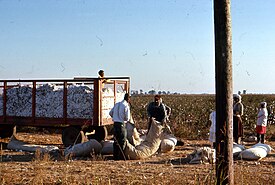Joseph S. Clark's and Robert F. Kennedy's tour of the Mississippi Delta
At the behest of civil rights lawyer Marian Wright, Clark and Kennedy, together with two other senators, traveled to Mississippi to investigate reports of extreme poverty and starvation.
In an attempt to generate national interest in renewing funding for the effort, the United States Senate Committee on Labor's Subcommittee on Poverty held a series of hearings related to hunger, starting March 15.
One of first the testifying witnesses was Marian Wright, a 27-year-old Yale Law School graduate working with the NAACP's Legal Defense Fund in Mississippi.
[1] She told the subcommittee that increased mechanization and requirements that cotton fields lie fallow under federal subsidy stipulations had put thousands of black sharecroppers out of work in the Mississippi Delta.
He disapproved of the federal efforts to improve the economic situation of black people and sought to discredit them by attacking the Head Start program's parent agency, the Child Development Group of Mississippi (CDGM).
The Head Start project provided services to impoverished children and was funded with grants from the federal government, thereby preventing state authorities from interfering with its activities.
[6] By potentially improving the socioeconomic status of black Mississippians, Head Start threatened the white political power base that dominated the state.
[7] In the days before Stennis' scheduled testimony Jackson's two newspapers, both supportive of segregation, ran several stories about the senator's planned critique.
Upon the poverty subcommittee's arrival in the city, Clark announced that he considered questions concerning Head Start and funding irregularities to already be answered and that the hearing would not spend significant time discussing the issue.
It was originally supposed to take place in a room meant to accommodate 300 persons, but the subcommittee relocated after local media attention stirred enough interest to bring the crowd to about 1,000 people.
He then declared that the federal government had bypassed "responsible, honest, capable local leadership" and in favor of northerners and as a result its offices had become "a stake hold of beatniks and immorality".
He requested that the governor be empowered to suspend "any project he determines not in the public interest" and finished by highlighting the fact that $500,000–$650,000 of CDGM's funds were proclaimed by a government audit to be unaccounted for.
It was also stated that the decline in demand for agriculture labor increased unemployment, and that many of the adults were unskilled, did not have access to adequate transportation or training programs, or faced racial discrimination in their work.
Robert Ezelle, former chairman of the Jackson Chamber of Commerce, asserted that the greatest problem afflicting Mississippi was its dysfunctional education system.
[11] Civil rights activist Unita Blackwell defended the Head Start program, saying it was the only anti-poverty initiative that addressed the locals' problems.
They were accompanied by Evers, Wright, Moore, Edelman, Carr, a dozen or so reporters from state and national newspapers and the Big Three television networks, and an assortment of U.S.
[13][14][15] That morning the senators reviewed anti-poverty programs underway in Greenville and a nearby tent city that had been established by striking farm workers.
After lunch, Kennedy's and Clark's motorcade traveled at speeds over 80 mph down U.S. Route 61 to visit locations specifically selected by Wright and Moore.
With no advance notice, Kennedy, his aides, and half a dozen reporters walked into the home of a 39-year-old man named Andrew Jackson, his wife, and their six kids.
The two stayed in the city for only 20 minutes; Clark climbed on top of a car to announce that their planned press conference was canceled, as their flight in Memphis was due to take off in two hours for the capital and he was "going to catch that plane."
"[17] The following morning Kennedy and Edelman met with Secretary of Agriculture Orville Freeman, and angrily criticized the food stamp program for charging families that had no income.
[17] Though Freeman was keen on avoiding a political dispute with Kennedy, he feared that by concurring with the senator he would anger the Southern bloc in Congress that held great influence over his department's budget.
"[15] The entire subcommittee sent a letter to President Lyndon B. Johnson about their discoveries and the findings of the Department of Agriculture officials who had been dispatched to the Delta, writing about "conditions of malnutrition and widespread hunger...that can only be described as shocking" and imploring federal government to declare an emergency.
Johnson had seen the news coverage of the event and on April 17 he ordered that his top domestic aide, Joseph Califano, give him a "quick report."
Califano replied 20 minutes later, writing that Freeman was hesitant to make major changes to the administration's food stamp program until the original system was sanctioned by Congress.
"[22] Once news of the situation in the Delta went public, Mississippi Governor Paul B. Johnson Jr. dismissed the report as the product of "Socialist-minded senators."
Following the publication in June of a particularly severe report compiled by the Field Foundation of New York, Governor Johnson quietly commissioned a statewide study about children's nutrition.
"[26] Kennedy openly expressed his frustration with Johnson administration officials' perceived inability to understand the extent of the Delta's problems and other bureaucratic complications, saying, "It seems to me we are floundering around a great deal.
[30] Around the same time CBS broadcast a major documentary, Hunger in America, which had been made on the suggestion of Kennedy to television executive Don Hewitt.
[29] In May 1997, Democratic Senator Paul Wellstone, inspired by the original trip, visited the Delta to bring attention to "race and gender and poverty and children in America.



